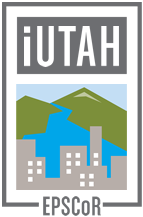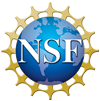iUTAH Team - Undergraduate iFellows
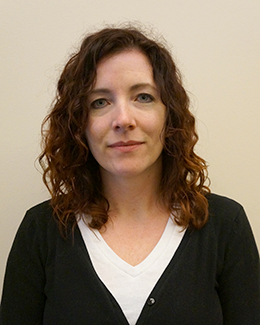
Greta Hamilton
Salt Lake Community College
Mentors:
Faculty: Greg Carling, BYU
Graduate: Hannah Checketts, BYU
Graduate:
Brian Packer, BYU
Research Focus:
Research Focus Area 1
Major:
Environmental Geology
Biography:
Greta was a member of the 2016 graduating class from Salt Lake Community College and will be furthering her study of geology at Westminster College in the Fall. She is excited to be doing field research and lab work with graduate students from BYU as part of the iFellows program. She enjoys all things outdoors, especially rock climbing and backpacking with her partner.
iFellow Presentation:
Quantification of MeHgFluctuations in the Provo River over a 24 hour cycle
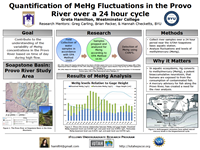
Presented by: Greta Hamilton
July 2016
Weekly Recap:
Week 1 | Week 2 | Week 3 | Week 4 | Week 5 | Week 6 | Week 7 | Week 8 | Week 9 | Week 10 | Week 11
Week 1: May 16-20, 2016
The week started off with the iFellows orientation and then it was right out in the field to collect overland flow samples and soil/water samples. It was great to meet everyone and get right to sampling. The next few days were spent on campus learning protocols for the mercury lab and hydrology lab as well as my way around BYU. I have had to stop for directions at least a half dozen times.

(From left to right) Brian, Hannah, Carrie, and Greta collecting overland flow samples in the Uintas to be tested for
Mercury and organic carbon and organic matter.
Week 2: May 23-27, 2016
This week started at Utah State University (USU) in Logan. The iFellow meeting presented us with insightful information regarding posters, presentations, and papers. Additionally, the group participated in hilarious improvisational scenarios to effectively communicate future presentations. The next few days were at Brigham Young University (BYU) in Provo. While at BYU, we prepped sample bags for our 24-hour field study that will be coming sometime in the next week or two as soon as the weather settles down. We monitor SNOTEL and USGS water data sites daily to close in on a date for the study. Brian walked me through a complete mercury run, from sample prep to the machine analysis. The end of the week had us out in the field for our weekly overland flow and Provo River sampling.
Week 3: May 30-June 3, 2016
This week, we did our 24 hour Provo River water sampling at Soapstone campground in the Uinta Mountain Range. Monday evening, we decided this was the week we would head up after considering the weather and expected snowpack runoff for the study. Tuesday was spent getting all the collection bottles and materials inventoried and put in bins for easy transport up the canyon. Wednesday morning, we loaded up the trucks and drove to Soapstone where we set up camp and our water processing stations. Additionally, we set up a clean station near the river where we used the geo-pump to collect water samples every hour before taking them back to the trailer for acidification and refrigeration. It took nearly 30 hours from set up to tear down and we made it home Thursday afternoon very tired but excited to see what the data will reveal over the next few weeks.

up the first collection run. Right Photo: The 24 hour sampling crew: Andrew, Natalie, Shawn, Brian, Greta, and Hannah.
Week 4: June 6-10, 2016
The first half of the week was spent prepping last week's water from the 24 hour sampling at the Provo river. We will start analysis in the next week. It was very interesting to see the progression of color in the sample bottles as the day progressed from noon to midnight. I have enclosed a photo for everyone else to see. The bottles are samples from Soapstone that will be run as the unfiltered Hg early next week. Thursday, we conducted our normal weekly river sampling from Soapstone, Woodland, and Hailstone.

Photo of color progression from the first 12 hours of the Provo River 24 hour sampling project.
Week 5: June 13-17, 2016
This week started off with the iFellows meeting on Monday. We practiced presenting our posters, which was a welcome exercise for many of us who needed to work on our speaking skills. Monday afternoon, was spent at the Provo River learning various water testing and measuring methods. The rest of the week was mostly spent in the lab prepping the unfiltered Provo River samples to be analyzed for methylmercury. The MeHg analysis is time and labor intensive. It took two days from prepping to final analysis to run the unfiltered 24 hour samples. There are 52 amber vials, 24 containing the river samples, 24 containing the river samples with a 1 ppb matrix spike, and 2 field blanks. The first day, the samples were acidified and matrix spikes were added. The second day, each sample was manually adjusted to a pH of 3.99 - 4.09, and the sodium tetraethylborate is added to each vial for ethylation, which is how the organic Hg is detected. Each run also requires 27 additional amber vials for rinsing, calibrating, ongoing precision and recovery, and the mercury standards. The mercury standards are vials with milli-q water and specific known amounts of MeHg. Once the trays of amber vials were stacked in the Mercury Guru 4.7, it takes about 9 hours for the run to complete and the raw data to be available. We also conducted our weekly field sampling at Soapstone, Woodland, and Hailstorm.

Acidifying the 24 hour samples to be analyzed for MeHg.
Week 6: June 20-24, 2016
The beginning of the week was spent prepping the filtered methylmercury (MeHg) to be analyzed. There was a malfunction with the software and the MeHg run had to be aborted halfway through, and we had to remake the calibration standards. During the second round of analysis, there was only one sample that was rejected and the run provided useful data. Mid-week was spent prepping a total mercury (THg) run, which also is a two day process to be analyzed. Unfortunately, the THg run failed mid-run when the needle to the analyzer broke. All the prepped samples and standards had to be discarded. This will set back the data that I have available for my poster since my mentor will be out of town next week. Hopefully, we can get things up and running again before the end of the program. Thankfully, the filtered and unfiltered MeHg data is available for use and I won't be showing up empty handed to our meeting on Monday. Friday was spent in the field collecting our routine samples. Normally, we would collect on Thursday, but the biology department took the probe and we postponed sampling until its return. The probes did not make it back and we had to do our sampling with out probe data. We then returned to BYU to filter and acidify the samples making for quite a long day. This week turned out to be just slightly off with minor setbacks throughout but nothing that can't be handled. All in all, it has been a very insightful week as far as dealing with situations where things don't go as planned, and I am told this is more the norm than the exception.

Photo of the source of our troubles this week, the automated MERX-M and MERX-T analyzer.
Week 7: June 27-July 1, 2016
This week started with our iFellows meeting on Monday where we learned about the importance of mentors and conferences before heading outside to check out the Red Butte GAMUT site. Tuesday, we went with the DEQ and several Provo river management agencies to view construction updates to the river diversion sites and rebuilt wetlands. The rest of the week was spent working at the University of Utah preparing our river samples to be run for trace metals in the ICPMS lab.

Photo of Hannah Checketts preparing vials for the Provo River samples.
Week 8: July 4-8, 2016
This weeks mercury run had to be pushed back because we are waiting on the delivery of a new analyzer needle. Hannah and I prepped the water samples for the DOC run on Wednesday. Hopefully, the results from the DOC analysis will available next week for use on my poster. The rest of the downtime during the week was spent composing a draft paper and poster for our mock presentations at USU on Friday. I received some useful feedback and plan to work on those changes for our symposium next Friday.
Week 9: July 11-15, 2016
This video describes my iUTAH research project on the hourly fluctuations of methylmercury in the Provo River.
Week 10: July 18-22, 2016
This week proved to be a very busy week writing abstracts for AGU and putting together presentation slides for next Tuesday. Time outside of writing was mostly spent in the lab getting the THg mercury machine online for analysis. The part for the needle had finally arrived. A calibration run was prepped and analyzed in order to test that analysis was running smooth before using actual river samples. Many of the calibrations were rejected so quality control methods were updated and the standards were remade. A second calibration run was prepped and analyzed with favorable results prompting the prep of a river sample run. Friday morning the reducing agents were added and the samples were being analyzed by the MERX-T machine.
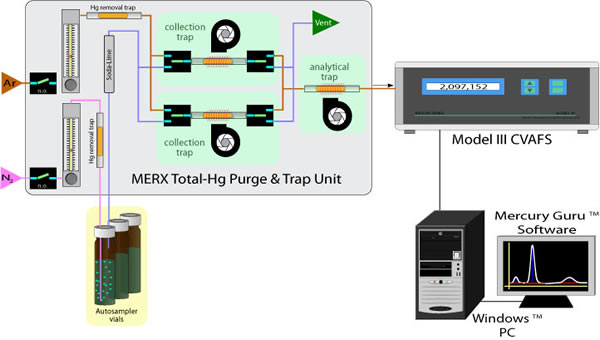
Diagram of the Brooks Rand MERX-T process for THg analysis.
Week 11: July 25-29, 2016
The final day of the iFellows program is here. As I write the final recap I am confronted with the sadness that inevitably comes with endings, and remind myself that I am at the beginning of an exciting journey that holds endless possibilities. I will be taking the skills I learned this summer and applying them to future endeavors. This program has been invaluable to myself and the other iFellows. I know this from talking to them and observing the sheer amount of effort everyone put into their research. I was impressed with everyone's presentation this week and could see that they were just as dedicated to the program as I was. As I make the final edits to my paper for submission today and write my final recap I find myself in a state of reflection and absolute gratitude for the iFellows program and the iUTAH staff who have been wonderful to work with. I will miss everyone in the program and wish them the best on their continuing journeys.
All content provided on this iUTAH Team - Undergraduate iFellows weekly recap is unedited, updated by each participant to provide a review of their progress, and is for informational purposes only.
